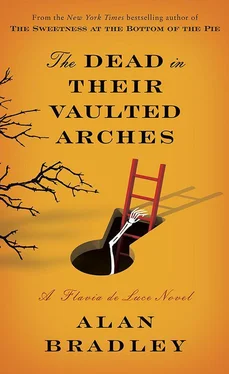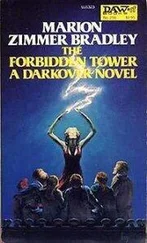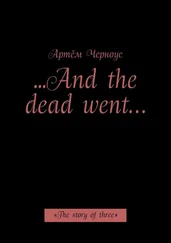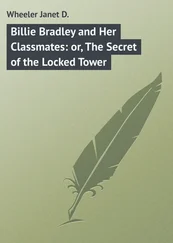No, I could not possibly tell Inspector Hewitt. Aunt Felicity had made it quite clear that I was to discuss the Nide and its activities with no one but her. They were beyond Top Secret. The Gamekeeper had spoken.
Nor, then, could I tell the Inspector anything about the stranger at the station: Terence Alfriston Tardiman, bachelor, of 3A Campden Gardens, Notting Hill Gate, London, W8, aged thirty-seven , Adam had said.
I would have to remain no more than a witness—an important one, to be sure—but a witness nonetheless.
I don’t mind admitting it was a bit of a bitter pill. I would have to fade into the wallpaper, so to speak, and let the Inspector take all the credit.
I could only hope that he and his henchmen had done their homework and were close to discovering on their own who had shoved Terence Tardiman under the train. Surely by now they must have discovered who at Buckshaw Halt had called out “Someone pushed him.”
If they were still baffled, I would perhaps have to send them an anonymous letter, made up of cutout letters from various newspaper headlines, pasted up on a sheet of waxed butcher’s paper, and posted from a pillar box in Fleet Street to avoid suspicion.
I should have to break my braces again to contrive a trip up to London, but it would be worth it. Perhaps Inspector Hewitt would suspect anyway, in his heart of hearts, the identity of the sender. He would recognize the fingerprints of my intelligence. Even so, he would never be able to prove it, or to admit openly that it was Flavia de Luce who had cracked the case.
We would smile at each other pleasantly over crumpets, the Inspector and I, and ask each other if we took cream or sugar with our tea, both of us knowing, but not speaking, the delicious truth.
I was dragged back into the present by the vicar’s voice saying: “Man that is born of a woman hath but a short time to live, and is full of misery. He cometh up, and is cut down, like a flower; he fleeth as it were a shadow, and never continueth in one stay. In the midst of life we are in death—”
Due to the circumstances, it had been agreed—although it was unusual—to have the committal to the grave inside the church as part of the funeral service.
Harriet was to be laid to rest in the family vault in the crypt below. Her coffin would be moved there later, at such time as, the vicar told us, “the mourners have dispersed.”
We were now nearing the end.
“Thou knowest, Lord,” the vicar said, “the secrets of our hearts.”
I glanced over at Lena. I couldn’t help myself.
She turned her head suddenly and met my gaze and held it, and I found that, try as I might, I could not look away.
It is said that certain poisonous snakes are able to petrify small animals with their gaze: a fact which I had doubted until now, even though Mrs. Mullet had warned me against Gertie Mumfield who had the evil eye and whose ignorant stare was not to be returned at any cost.
Whatever the case, I was simply unable to break the gaze in which Lena had locked me. Something unknown was passing back—and surprisingly forth —from her eye to mine: a silent telegraphic conversation which I was too inexperienced to decode.
She knew that I knew. There could be no doubt about it. She was sucking the truth from my eyes and there was nothing I could do to stop it.
Only with the greatest effort was I able to lower my lids, although it was like trying to force down a paint-encrusted window sash.
I turned my head away and rolled my eyes down towards the floor before I dared open them again.
To my horror, the vicar had already arrived at that part of the service where we would be asked to step forward, each in turn—Father, Feely, Daffy, me—to sprinkle a small handful of dirt from the graveyard onto Harriet’s coffin.
“—thou most worthy Judge eternal,” he was now saying, “suffer us not, at our last hour, for any pains of death, to fall from thee.”
He nodded at Father, who rose up and tottered forward like an automaton which had not been actuated for a century.
Daffy and I followed.
“Ashes to ashes, dust to dust; in sure and certain hope of the Resurrection to eternal life—”
How cruel those words were! I didn’t want to hear them.
I clapped my hands to my ears and took a backwards step. In doing so, I must have caught my foot on the lower of the chancel steps. I reached out to steady myself from falling by grabbing the corner of Harriet’s coffin.
As I regained my balance, I saw Inspector Hewitt coming quickly up the center aisle.
Could he be that worried about me?
Probably not, because Detective Sergeant Woolmer, moving like a heavy lorry, was already halfway up one of the side aisles—and Detective Sergeant Graves was blocking the other.
What was going on here? Had they been asked to participate in the committal?
Or had they—as I had desperately hoped—worked out the identity of the killer on the platform?
There was a loud bang behind me.
Lena had broken from her pew and was already at the top of the chancel steps. She reminded me for a moment of a panicked horse whose stable has been struck by lightning. Her nostrils flared, and as her head swung round, I could see the whites of her eyes.
Into the choir she galloped, not seeming to realize that there was no way out. All the while, Inspector Hewitt was approaching the front pews with slow but deliberate steps.
Sergeant Graves, smaller, lighter, and younger, had already reached the front of the side aisle. He was so close that I could have reached out and touched him. He stopped in his tracks as Inspector Hewitt raised a warning hand.
In the far aisle, Sergeant Woolmer had not yet reached the front.
Lena put a hand on the altar, as if she was planning to climb onto it, but she quickly found that it was too high. Spinning round, she saw that Inspector Hewitt and Sergeant Graves were on the move again, slowly closing in on her—trapping her in an invisible net.
She ripped at her waist and stepped—shockingly, defiantly—out of her tight black skirt. She could not be hobbled: She needed to be able to run. Her silk slip glistened obscenely in the sunlight.
Of the three policemen, Sergeant Woolmer was farthest from her, and she chose to make her break in that direction.
Except for the insistent shuffling of one pair of shoes and three pairs of police boots on marble, all of this took place in near silence. It was uncanny: a scene from a silent film in the earliest days of experimental sound.
At the last possible moment, just as she was about to run into the powerful arms of Sergeant Woolmer, Lena veered unexpectedly to the left and bolted into the chapel: the little chapel in which Samson lay with his head in the lap of his lady love, and in which he also crumbled the house of his tormentors.
It was a bad mistake, and Lena must have realized that at once.
She was cornered.
She froze in her tracks, turned round looking this way and that, and even though it was for only a fraction of a second, my brain took a mental snapshot of her. In fact, if I close my eyes, I can still see her as she was in that moment—her long red hair broken loose from its moorings, her eyes wide, the tip of her tongue licking her lips—but only once. Her chest was heaving visibly as she glanced back over her shoulder, her ragged, rasping breath now clearly audible in the shocked silence.
I wish I could say that there was a twisted look of hatred on her face, but there was not. Rather, she had the look of a woman who has realized halfway to the car that she has left her purse on the kitchen table.
They stood like that for an endless moment, unmoving, Lena and the police, like actors frozen in a tiring tableau vivant .
Читать дальше












